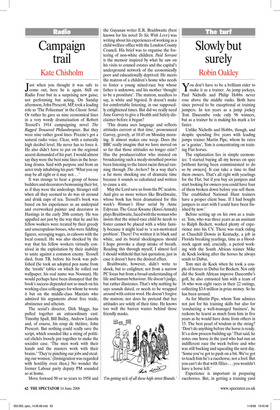Campaign trail
Kate Chisholm
Just when you thought it was safe to come out, here he is again. Still on Radio Four but in a surprising new guise; not performing but acting. On Sunday afternoon, John Prescott, MP, took a leading role as ‘The Policeman’ in the Classic Serial. Or rather he gave us nine economical lines in a very wordy dramatisation of Robert Tressell’s 1914 campaigning novel The Ragged Trousered Philanthropists. But they were nine rather good lines. Prezzie’s got a natural radio voice. Clear, with a naturally high decibel level. He never has to force it. He also didn’t have to put on the regional accent demanded of his part. I would almost say they were the best nine lines in the hourlong drama. Said with purpose and from an actor truly inhabiting his part: ‘What you say may be all right or it may not... ’ It was strange to hear a group of house builders and decorators bemoaning their lot, as if they were the underdogs. Stranger still when all they seemed to do was sit around and drink cups of tea. Tressell’s book was based on his experiences as an underpaid and overworked painter and decorator in Hastings in the early 20th century. He was appalled not just by the way that he and his fellow workers were treated by their greedy and unscrupulous bosses, who were fiddling figures, scrooging wages, in cahoots with the local council. He was also shocked by the way that his fellow workers virtually connived in the exploitation by their inability to unite against a common enemy. Tressell died, from TB, before his book was published (he took an adopted pen name from the ‘trestle’ tables on which he rolled out wallpaper, his real name was Noonan). He would perhaps have been dismayed that the book’s success depended not so much on his working-class colleagues for whom he wrote it but on the middle-class Marxists who admired his arguments about free trade, abstinence and atheism.
The serial’s director, Dirk Maggs, has pulled together an extraordinary cast: Timothy Spall, Bill Bailey, Andrew Lincoln and, of course, his coup de théâtre, John Prescott. But nothing could really save the script, which sounded like a string of political clichés loosely put together to make the socialist case. ‘The men work with their hands and the masters work with their brains.’ ‘They’re pinching our jobs and stealing our women.’ (Immigration was regarded with hostility even then.) No wonder the former Labour party deputy PM sounded so at home.
Move forward 50 or so years to 1958 and the Guyanan writer E.R. Braithwaite (best known for his novel To Sir, With Love) was writing about his experiences of working as a child welfare office with the London County Council. His brief was to organise the fostering of non-white children. Paid Servant is the memoir inspired by what he saw on his visits to council estates and the capital’s underground network of the economically poor and educationally deprived. He meets the matron of a children’s home who needs to foster a young mixed-race boy whose father is unknown, and his mother ‘thought to be a prostitute’. The matron, needless to say, is white and bigoted. It doesn’t make for comfortable listening, in our supposedly enlightened times. But did we really need Jane Garvey to give a Health and Safety disclaimer before it began?
‘This drama uses language and reflects attitudes current at that time,’ pronounced Garvey, gravely, at 10.45 on Monday morning. It almost makes one weep. Does the BBC really imagine that we have moved on so far that those attitudes no longer exist? Has the producer/editor who insisted on broadcasting such a mealy-mouthed proviso been listening to the latest racist thread running through The Archers? In a way that’s a far more shocking use of dramatic time because it sounds so calculated and written to cause a stir.
May the Lord save us from the PC zealots. And give us more writers like Braithwaite, whose book has been dramatised for this week’s Woman’s Hour serial by Anne Edyvean. The Great Kwame (Kwei-Armah) plays Braithwaite, faced with the woman who insists that the mixed-race child he needs to foster cannot be placed with a white family because it might lead to ‘a sex-motivated problem’. There! I’ve written it in black and white, and its brutal shockingness should I hope provoke a sharp intake of breath. Reading this through myself, I almost feel I should withhold that last quotation, just in case it doesn’t have the desired effect.
Braithwaite, however, didn’t write to shock, but to enlighten; not from a narrow PC focus but from a broad understanding of life and human behaviour. He doesn’t judge, but rather illustrates. That’s why nothing he says sounds dated, or needs to be wrapped around with cotton wool. He doesn’t forgive the matron; nor does he pretend that her attitudes are solely of their time. He knows too well the barren wastes behind those friendly masks.


















































































 Previous page
Previous page